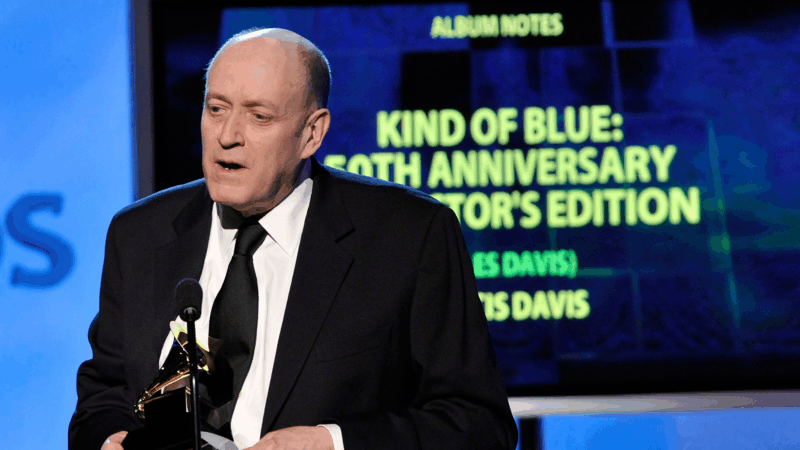Francis Davis, a figurehead of jazz criticism, has died
Francis Davis, an articulate and gimlet-eyed cultural critic who achieved an eminent stature in jazz, died on Monday at his home in Philadelphia. He was 78.
His wife, Terry Gross, the co-executive producer and host of Fresh Air, confirmed his death to NPR Music. Davis had been under the care of home hospice since last fall, living with emphysema and Parkinson’s disease.
Davis held an influential post at The Village Voice, inheriting its main jazz column from Gary Giddins in 2004. Two years later he started a year-end Jazz Critics Poll at the Voice, running it annually there until 2011. Davis later brought this poll to NPR Music, where it resided from 2013 to 2020; in the years since, it has had a home at ArtsFuse. Wherever it landed, the Francis Davis Jazz Critics Poll, as it came to be known, always gestured toward a notion of consensus, underscoring his standing as a leader among his peers.
For decades, Davis was a contributing editor to The Atlantic, defining its coverage of jazz. “Francis’s frame of vision was so broad: He profiled John Zorn and Benny Carter in the same year, and both pieces are equally sharp,” David A. Graham, a current staff writer at the magazine, tells NPR Music. “I’m always impressed by how easily he saw through fads — from the ‘piousness’ of ’70s fusion to the backward glance of the Young Lions — while conveying for even casual readers what made the best jazz so great.”
During his long tenure with The Atlantic, Davis did much of the reporting and writing that furnished his essay collections. One of these, Jazz and Its Discontents: A Francis Davis Reader, from 2004, opens with his wry advice about courting book publishers: “Promise them a concept album and give them your greatest hits.”
But Davis stamped each of his books with judicious editorial rigor, along with ample literary flair. In 1990, reviewing his collection Outcats: Jazz Composers, Instrumentalists, and Singers, the Washington Post book critic Jonathan Yardley pegged Davis as “a sympathetic observer of the complexities of the artistic life,” adding that “he is a sensitive, knowledgeable, perceptive, imaginative critic, and even when he’s moping he’s a pleasure to read.”
More than many of his contemporaries, Davis peered beyond the given framework of any musical subject, keen to consider the context, both cultural and commercial. His liner notes for the 2009 Miles Davis reissue Kind of Blue: 50th Anniversary Collector’s Edition provide a case in point. “In terms of where it falls in jazz history, Kind of Blue is celebrated for being the album that popularized improvising on modes — that is, improvising in the sparest and starkest of scales as an alternative to bebop’s dense thickets of chord changes,” Davis wrote. “But this hardly explains the album’s hold on three successive generations of listeners, most of whom probably wouldn’t know a mode from a Mercedes Benz.”
He won a Grammy award for those album notes. He was also awarded a Guggenheim Fellowship in 1993 and a Pew Fellowship in 1994. He received the ASCAP Deems Taylor Award on numerous occasions, including a special recognition for his 2001 essay collection Like Young: Jazz, Pop, Youth and Middle Age.
Francis John Davis was born in Philadelphia on Aug. 30, 1946. His mother, the former Dorothy McCartney, worked as a medical clerk; he never knew his father. “I think of myself as a war baby, in a way,” he said in a 2001 interview with Joe Maita, for the online magazine Jerry Jazz Musician. “I grew up in a home where my mother had lost her brother in WWII. I am named after her brother. We had my grandmother in the house as well.”
As a teenager, Davis recalled in the same interview, he got a part-time job at a branch of the Free Library of Philadelphia. There he indulged a passion for books, and was struck especially by a 1959 Norman Mailer collection, Advertisements for Myself. “It was the first time I read anybody who wrote on writing,” Davis said. “He would talk about word choices, and how he had changed one word to another. It was also a book that gave a sense of writing as an intensely masculine activity.”
Davis attended Temple University from 1964 to ’69. He was there for saxophonist John Coltrane’s performance in ’66, released nearly half a century later as Offering: Live at Temple University. “The walkouts began 15 minutes or so into the evening’s first tune,” Davis later wrote of the concert, a deep plunge into avant-garde expression. “What was shocking about the exodus was that these were Coltrane addicts presumably undaunted by the turbulence and complexity of his music to that point, but grief-stricken by what they were hearing now.”
He himself was far from grief-stricken; by the concert’s end, he was on his feet cheering. He’d later recall this as one moment that inspired him to become a music critic, though it took a little while. In the meantime, he worked at record stores — including a branch of Listening Booth, on the campus of the University of Pennsylvania. He was a manager of that store in the late 1970s, when Terry Gross, an up-and-coming host at WHYY, began stopping in.
“It was near the radio station, maybe 10 blocks away,” Gross says of the Listening Booth, where she knew a fellow employee. “It was easy to walk over when I needed a record. I had a three-hour show five days a week, so I needed to fill time: I needed film critics and art critics and music critics. I asked him if he would consider doing a piece on spec where he would choose an out-of-print jazz recording that no one had access to, and play excerpts of the album and talk about why it mattered — in terms of the musician, the composition, but also in the context of the jazz and popular-culture world. And the script he sent in was so beautifully written. I didn’t even know he was a writer. He started doing that regularly, for a weekly series he called Interval.”
As they worked together, Gross and Davis formed a friendship that blossomed into something more. “Our first date, so to speak, was an Abdullah Ibrahim concert in West Philly; I’m pretty sure it was at St. Mary’s Church,” Gross remembers. “Then we went to hear Jonathan Richman and The Modern Lovers, and then we went to hear Lou Reed. And by then, the deal was sealed.” Davis and Gross became a couple in 1978. They married in 1994.
Davis covered jazz for the Philadelphia Inquirer from 1978 to 1983. And when Fresh Air with Terry Gross went national in 1987, Davis was its first jazz critic. Within a year, he decided that radio was not his natural medium; for his replacement, he recommended Kevin Whitehead, whose reviews he’d read in Cadence magazine. (Last year, Whitehead stepped down after more than 35 years with the show.) “It was such a perfect suggestion,” Gross says of the handoff. “Kevin also has that kind of hard-boiled sound on air. Francis’ sensibility was so shaped by film noir and hard-boiled detective fiction. It all really made sense.”
Davis’ interest in film, literature and popular song resulted in a range of articles outside his jazz purview. His friendship with the legendary film critic Pauline Kael resulted in a book with a self-explanatory title: Afterglow: A Last Conversation With Pauline Kael. (Writing in Salon, Allen Barra described it as “an important little book that serves as both oral history and memoir.”)
As for a Last Conversation with Francis Davis, he provided one, in a manner of speaking, as the keynote essay for the 19th Annual Francis Davis Jazz Critics Poll. Divulging details about his ongoing health struggle, in a characteristically sardonic tone, he also expresses some rueful feelings for the calling to which he’d devoted a distinguished career. “Maybe I was the last to learn that criticism had outlived its usefulness as far as the arts and entertainment industry were concerned,” he writes. “Or maybe only I have outlived mine.”
What I learned watching every sport at the Winter Olympics
Sit down with pop culture critic Linda Holmes as she watches the 2026 Winter Games. She is exhausted by cross-country, says "ow ow ow" during moguls, and makes the case, once and for all, for curling.
Scientists worry about lasting damage from Potomac sewage spill
Drinking water around the District of Columbia hasn't been contaminated. But scientists say the environmental damage could be severe.
What worked and what didn’t with a cellphone ban at a Kentucky school
Keeping students off their devices is the new norm in many schools. We talked to students and educators at one Kentucky school to see how it's working.
Using saliva to detect disease holds promise, but it’s not perfected yet
Easier than a blood test, saliva tests have the potential to detect cavities, infections and even cancer. But a lack of insurance coverage and other obstacles stand in the way of wider use.
Israeli settlers kill 19-year-old Palestinian American, officials and witnesses say
Israeli settlers in the occupied West Bank shot and killed a Palestinian American man during an attack on a village, the Palestinian Health Ministry said.
Trump says he doesn’t know if aliens are real but directs government to release files on UFOs
President Donald Trump said Thursday that he's directing the Pentagon and other government agencies to release files related to extraterrestrials and UFOs because of "tremendous interest."








